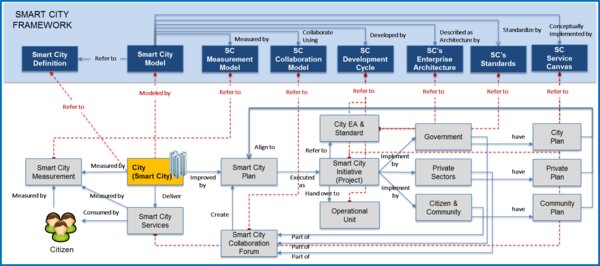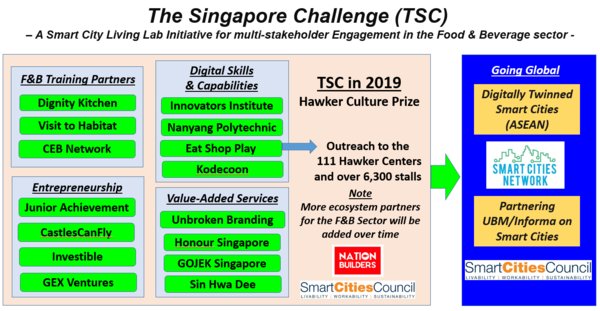 |
SINGAPORE, March 20, 2019 /PRNewswire/ -- Many governments and cities have embarked on their smart cities initiative, with the hope to ride on the technology bandwagon to improve the lives of their citizens. But it's not that simple. The global smart cities market size is projected to grow from USD308 billion in 2017 to USD717.2 billion by 2023, at a compound annual growth rate (CAGR) of 18.4 per cent[1]. Across regions, the smart cities market has been segmented into four major focus areas: transportation, utilities, buildings, and smart citizen services. Rapid connectivity, fast telecommunication provision, growing population, and hyper-urbanisation are the major driving factors for the smart cities market.
The ASEAN Smart Cities Network (ASCN) was established in 2018 when Singapore was the Chair for ASEAN. The ASCN aims to facilitate cooperation on smart cities development, catalyse bankable projects with the private sector, and secure funding and support from ASEAN's external partners.
26 Pilot cities in the 10 ASEAN Member States have drafted projects where solution providers from all over the world were invited to participate. Through meetings and workshops organised by the ASCN, several challenges and obstacles in executing these projects came to light, and Professor Suhono Harso Supangkat, President of the Smart Indonesia Initiatives Association and Tay Kok Chin, Chairman of the Smart Cities Networks, reached a unified consensus on how smart cities should be developed - it needs to be REAL (Relevant, Engaging, Actionable and for Learning).
1. Relevant
The majority of smart cities today are led by government agencies. This is important for the building of technology infrastructure, such as sensor networks. However, for such smart city projects to be successful, it should also be relevant to the private sector.
2. Engaging
When Indonesia launched its Smart Cities Initiatives in 2014, cities were expected to put in place a Command and Control Centre and a Call Centre. This has been the case for cities like Jakarta, Makassar, Bandung, and Semarang in Indonesia. The Garuda Smart City Framework (see diagram below) offers a practical model for public, private and people engagement in Indonesia which can be replicated elsewhere in the world.

In Singapore, the "One Service" App by the Municipal Service Office coordinates public feedback and channels them to 9 different government agencies.
3. Actionable
Too often, solution providers expect governments to allocate budgets for smart city projects. More often than not, however, many of these projects are not implemented due to a lack of resources, be it in terms of finances, people or skills. All these factors have to be considered, and one viable approach is to embark on "bankable projects", as advocated by the ASEAN Smart City Network.
For example, smart street lighting would be an excellent actionable smart city project. The model requires minimal upfront financial investment, and the infrastructure investment can be made by external parties, in return for guaranteed energy savings and downstream compensation to the external parties involved.
4. Learning
In order for smart cities projects to be sustainable, we believe that the existing curriculum of academic institutions today should be tightly integrated with content that is relevant to the development of smart cities. This will then help groom the next generation for smart cities of tomorrow. The Singapore Challenge 2019 (see diagram below) is an example of such an integrated academia-industry model for the Food and Beverage sector.

Implementation of Smart Cities via the Smart City Living Lab Concept
Smart City Living Lab is an approach conducted for the implementation of smart city in a small (or very small) area of the city so that the impact of the implementation can be directly felt by the community and measurable.
Singapore has been a test-bed of numerous innovations. The country has recently designated the Punggol Digital District with the "Digital Twin" concept to promote industry-academia collaboration and future jobs via the Living Lab concept for innovators, visitors, residents and tenants in the District.
Smart Cities Network has also collaborated with the Smart Indonesia Initiatives Association on an MOU for Inclusive and Sustainable Smart Cities signed last September 2018 in Bandung. An objective of the MOU is the setting up of the Smart City Accelerator Hubs in the region. Subsequently, the start-ups from Singapore and Bandung have co-operated in a project to develop the 3D model of the Bandung Command Centre.
[1] MarketsandMarkets – Smart Cities Market: https://www.marketsandmarkets.com/Market-Reports/smart-cities-market-542.html?gclid=CjwKCAiAt4rfBRBKEiwAC678KTxORoOtt7nd-KkFtuUxBq3ap5mxYfFBNUwQHGTqgPUFsn-OdSaTvxoCU1IQAvD_BwE
|
Notes:
1) Professor Suhono Harso Supangkat is generally regarded as the "Father of Smart Cities in Indonesia", and has advised many city mayors in Indonesia. He has signed an MOU with Kok-Chin Tay, Chairman of Smart Cities Network in September 2018 to develop Inclusive and Sustainable Smart Cities.
2) Tay Kok Chin is the Chairman of the Smart Cities Network (SCN) for solutions and services providers with an ecosystem network of government agencies, business and industry groups and the people sector in Singapore, ASEAN and globally. He is also the Lead for Smart Cities Council in ASEAN.
3) Smart Cities Network will run a 'Smart Cities Project Activation – For Malaysia' roadshow event in Kuala Lumpur on 16 April, 9am – 5pm. This workshop will impart insights with case studies and lessons from two Malaysian states to transform their cities. Email Caroline Khoo to attend!
4) Tay Kok Chin will be moderating the Future Cities Panel – Building the Foundations of Smart Cities and Beyond, on Day 1 of the ConnecTechAsia Summit, 18 June 2019. In this session, leaders and subject experts will discuss pertinent challenges facing the amalgamation of smart cities, as well as infrastructure and regulatory issues in driving digitalisation, citizen inclusiveness and sustainability of future cities. Prof Suhono will be one of the Panel Speakers. Register here to attend!
5) The Smart Cities Network will host a half-day workshop titled 'ASEAN Smart Cities Project Activation' at ConnecTechAsia on Day 2, 19 June 2019. Representatives of Smart Cities in ASEAN will be invited to share on potential projects with interested business investors and partners. More details to follow soon.
For more information on ConnecTechAsia, please visit www.ConnecTechAsia.com.
Join our social conversation:
FB | Twitter | LinkedIn – #ConnecTechAsia
FB | Twitter | LinkedIn – #BroadcastAsia
FB | Twitter | LinkedIn – #CommunicAsia
FB | Twitter | LinkedIn – #NXTAsia
About UBM
ConnecTechAsia is organised by UBM, which in June 2018 combined with Informa PLC to become a leading B2B information services group and the largest B2B Events organiser in the world. Please visit www.ubm.com/singapore for more information about our presence in Singapore.
Media Contacts
Patricia Yee / June Seah
UBM
Tel: +65 9382 7452 / +65 9852 6756
Email: patricia.yee@ubm.com / june.seah@ubm.com
Photo - https://photos.prnasia.com/prnh/20190319/2407387-1-a
Photo - https://photos.prnasia.com/prnh/20190319/2407387-1-b
Photo - https://photos.prnasia.com/prnh/20190319/2407387-1-c
Logo - https://photos.prnasia.com/prnh/20190319/2407387-1LOGO